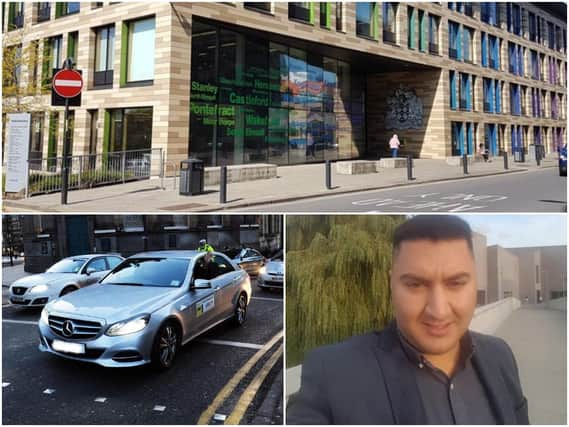Council accused of "playing Russian roulette" with Wakefield taxi drivers' lives in row over screens


Local cabbies have been stopped from putting up partition screens between the front and rear seats in private hire vehicles, as a temporary coronavirus precaution.
Councils in Leeds, Manchester and Nottingham have allowed their licensed drivers to put up screens, in a bid to minimise the risk of infection to and from passengers, while Uber has taken similar measures.
Advertisement
Hide AdAdvertisement
Hide AdBut despite calls from some drivers in Wakefield to be allowed to follow suit, the council has refused, advising only that both passengers and drivers wear masks, wash their hands and keep surfaces clean.
The decision was strongly criticised by local driver Wajid Ali.
He said that although some of his colleagues have returned to work, the decision was another blow to the trade after lockdown forced cabbies to stay home.
"I won't go back to work without a safety screen," Mr Ali said.
Advertisement
Hide AdAdvertisement
Hide Ad"That means me losing out on financial gain, but my life is important.
"Shops have got protective screens up. Pubs will be coming back with screens, so why can't we have screens? Our vehicle is our place of work.
"If we're carrying 15 passengers a day, then that's 15 different environments and workplaces we're being exposed to every day.
"We're offering an important service and we're taking pressure off public transport. But we're being asked to go out onto the frontline and put ourselves in danger.
"They're playing Russian roulette with our lives."
Advertisement
Hide AdAdvertisement
Hide AdMr Ali also cited the disproportionate impact of coronavirus on black and ethnic minority groups (BAME), pointing out that most cabbies in Wakefield are from the South Asian community.
People from ethnic minority backgrounds have been hit by a higher death rate from the virus.
He also suggested the industry could take legal action against the council if any driver was to die from COVID-19 while working without a screen.
Current guidelines do allow some private hire vehicles to put up screens permanently, but only if they fit very specific criteria. That process can be lengthy, leaving some drivers either out of pocket or more at risk in the meantime.
Advertisement
Hide AdAdvertisement
Hide AdThe issue has been taken up in other parts of the country, with unions Unite and the RMT expressing concerns on behalf of drivers.
It's understood that some of the 1,500 cabbies working in Wakefield have not taken issue with the council's stance.
But Mr Ali added: "If the screens save one life then they'll have been worth it.
"Hindsight is a wonderful thing and we're trying to get the council to see the benefits of this before it's too late.
Advertisement
Hide AdAdvertisement
Hide Ad"We're not even asking for money from the taxpayer to put them in as Leeds have done. We just want a 'yes' to allow us to do it ourselves.
"We want to protect the whole Wakefield community, not just ourselves."
In response, senior council officer Glynn Humphries said: "We ask all drivers and operators to ensure they comply with the current government guidance to help keep themselves and their passengers safe.
"This includes the use of PPE, ventilation in vehicles and antibacterial cleaning of affected surfaces following each journey.
"We will continue to permit drivers to install permanent screens, provided they conform to the criteria in respect of design and materials."
Local Democracy Reporting Service